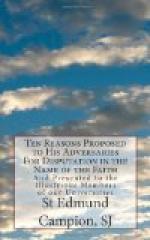the Jews, nor private judgment, like the Sectaries,
but that Spirit wherewith Christ animates the whole
Church. The Church, the guardian of this treasure,
not its mistress (as heretics falsely make out), vindicated
publicly in former times by very ancient Councils
this entire treasure, which the Council of Trent has
taken up and embraced. Augustine also in a special
discussion on one small portion of Scripture cannot
bring himself to think that any man’s rash murmuring
should be permitted to thrust out of the Canon the
book of Wisdom, which even in his time had obtained
a sure place as a well-authenticated and Canonical
book in the reckoning of the Church, the judgment
of ages, the testimony of ancients, and the sense
of the faithful. What would he say now if he
were alive on earth, and saw men like Luther and Calvin
manufacturing Bibles, filing down Old and New Testament
with a neat pretty little file of their own, setting
aside, not the book of wisdom alone, but with it very
many others from the list of Canonical Books?
Thus whatever does not come out from their shop, by
a mad decree, is liable to be, spat upon by all as
a rude and barbarous composition. They who have
stooped to this dire and execrable way of saving themselves
surely are beaten, overthrown, and flung rolling in
the dust, for all their fine praises that are in the
mouths of their admirers, for all their traffic in
priesthoods, for all their bawling in pulpits, for
all their sentencing of Catholics to chains, rack
and gallows. Seated in their armchairs as censors,
as though any one had elected them to that office,
they seize their pens and mark passages as spurious
even in God’s own Holy Writ, putting their pens
through whatever they cannot stomach. Can any
fairly educated man be afraid of battalions of such
enemies? If in the midst of your learned body
they had recourse to such trickster’s arts, calling
like wizards upon their familiar spirit, you would
shout at them,—you would stamp your feet
at them. For instance I would ask them what right
they have to rend and mutilate the body of the Bible.
They would answer that they do not cut out true Scriptures,
but prune away supposititious accretions. By
authority of what judge? By the Holy Ghost.
This is the answer prescribed by Calvin (Instit.
lib. I, c. 7), for escaping this judgment
of the Church whereby spirits of prophesy are examined.
Why then do some of you tear out one piece of Scripture,
and others another, whereas you all boast of being
led by the same Spirit? The Spirit of the Calvinists
receives six Epistles which do not please the Lutheran
Spirit, both all the while in full confidence reposing
on the Holy Ghost. The Anabaptists call the book
of Job a fable, intermixed with tragedy and comedy.
How do they know? The Spirit has taught them.
Whereas the Song of Solomon is admired by Catholics
as a paradise of the soul, a hidden manna, and rich
delight in Christ, Castalio, a lewd rogue, has reckoned




